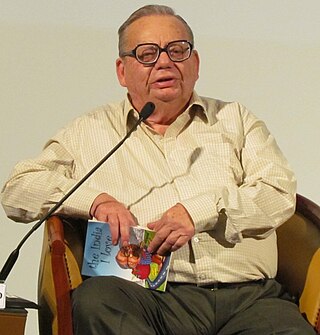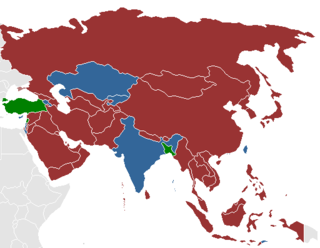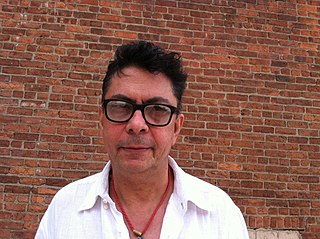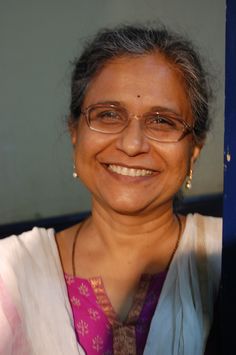
Vikram Seth is an Indian novelist and poet. He has written several novels and poetry books. He has won several awards such as Padma Shri, Sahitya Academy Award, Pravasi Bharatiya Samman, WH Smith Literary Award and Crossword Book Award. Seth's collections of poetry such as Mappings and Beastly Tales are notable contributions to the Indian English language poetry canon.

Ruskin Bond is an Indian author. His first novel, The Room on the Roof, was published in 1956, and it received the John Llewellyn Rhys Prize in 1957. Bond has authored more than 500 short stories, essays, and novels which includes 69 books for children. He was awarded the Sahitya Akademi Award in 1992 for Our Trees Still Grow in Dehra. He was awarded the Padma Shri in 1999 and Padma Bhushan in 2014. He lives with his adopted family in Landour, Mussoorie, in the Indian state of Uttarakhand.
Anita Desai, born Anita Mazumdar, is an Indian novelist and the Emerita John E. Burchard Professor of Humanities at the Massachusetts Institute of Technology. As a writer she has been shortlisted for the Booker Prize three times. She received a Sahitya Akademi Award in 1978 for her novel Fire on the Mountain, from the Sahitya Akademi, India's National Academy of Letters. She won the British Guardian Prize for The Village by the Sea (1983). Her other works include The Peacock, Voices in the City, Fire on the Mountain and an anthology of short stories, Games at Twilight. She is on the advisory board of the Lalit Kala Akademi and a Fellow of the Royal Society of Literature, London.

Hailakandi district is one of the 33 districts of Assam state in north-eastern India. It makes up the Barak Valley alongside Cachar and Karimganj. It was constituted as a civil subdivision on 1 June 1869. Subsequently, it was upgraded to a district in 1989, when it was split from Cachar district.
Samit Basu is an Indian novelist and filmmaker whose body of work includes science fiction, fantasy and superhero novels, children's books, graphic novels, short stories, and a Netflix film. His most recently published novel is The City Inside, an anti dystopian near future science fiction novel set in Delhi and published by Macmillan imprint Tordotcom. Its previous Indian edition Chosen Spirits, published 2020, was shortlisted for the JCB Prize for Literature.

Prostitution is legal in India, but a number of related activities including soliciting, kerb crawling, owning or managing a brothel, prostitution in a hotel, child prostitution, pimping and pandering are illegal. There are, however, many brothels illegally operating in Indian cities including Mumbai, Delhi, Kolkata, Bangalore, and Chennai. UNAIDS estimate there were 657,829 prostitutes in the country as of 2016. Other unofficial estimates have calculated India has roughly 3–10 million prostitutes. India is widely regarded as having one of the world's largest commercial sex industry. It has emerged as a global hub of sex tourism, attracting sex tourists from wealthy countries. The sex industry in India is a multi-billion dollar one, and one of the fastest growing.

The White Tiger is a novel by Indian author Aravind Adiga. It was published in 2008 and won the 40th Booker Prize the same year. The novel provides a darkly humorous perspective of India's class struggle in a globalized world as told through a retrospective narration from Balram Halwai, a village boy. The novel examines issues of the Hindu religion, caste, loyalty, corruption and poverty in India.
G.B. Road,Garstin Bastion Road, is a road running from Ajmeri Gate to Lahori Gate in Delhi, India. It is a large red-light district. It has several hundred multi-storey brothels and there are estimated to be over 1,000 sex workers. It is lined with two or three-storey buildings that have shops on ground floor. About twenty of these buildings have about 100 brothels on the first floor that open at night after the shops at ground level close. It is the biggest red light area in Delhi.

Namita Gokhale is an Indian writer, editor, festival director, and publisher. Her debut novel, Paro: Dreams of Passion was released in 1984, and she has since written fiction and nonfiction, and edited nonfiction collections. She conceptualized and hosted the Doordarshan show Kitaabnama: Books and Beyond and is a founder and co-director of the Jaipur Literature Festival. She won the 2021 Sahitya Akademi Award.

Anuja Chauhan is an Indian author, advertiser and screenwriter. As a writer, she is known for The Zoya Factor (2008), Battle For Bittora (2010), Those Pricey Thakur Girls (2013), The House That BJ Built (2015), Baaz (2017), and Club You To Death (2021). She worked at the JWT advertising agency in India for over 17 years, becoming vice-president and executive creative director before resigning in 2010 to pursue a full-time literary career.

Chittrovanu Mazumdar is a contemporary Indian artist of Bengali-Indian and French descent. Mazumdar has been described as a "conceptual artist" and a "post-structuralist" while some critics consider it difficult to classify his oeuvre into a single artistic tradition or even into any consistent genre of his own. Mazudmar has referred to himself as an "expressionist painter" but has also said he generally prefers not to use "a particular word to qualify" his work because it comprises different kinds of media and forms, and that art is more interesting when fully given over to the viewer's own experience rather than constrained by the prescriptive power of labels.

The LGBTQ community has a long recorded history in Ancient India due to the prevalence of the accepting Hindu spiritual traditions and cultures across the subcontinent, with a turbulent period following Islamic Turkic rule and Christian European colonialism that introduced homophobic and transphobic laws, thus criminalizing homosexuality and transsexuality. In the 21st century following independence, there has been a significant amount of progress made on liberalizing LGBTQ laws and reversing the homophobia and transphobia of the previous colonial era.
The light has gone out of our lives is a speech that was delivered ex tempore by Jawaharlal Nehru, the first Prime Minister of India, on January 30, 1948, following the assassination of Mahatma Gandhi earlier that evening. It is often cited as one of the greatest speeches in history.

Arunima Sinha is an Indian mountaineer and sportswoman. She is the world's first female amputee to scale Mount Everest(Asia), Mount Kilimanjaro (Africa), Mount Elbrus (Europe), Mount Kosciusko (Australia), Mount Aconcagua, Mount Denali and Mount Vinson(Antarctica). She is also a seven time Indian volleyball player and is also the world's first female amputee to climb Mount Everest.
"Lihaaf" is a 1942 Urdu short story written by Ismat Chughtai. Published in the Urdu literary journal Adab-i-Latif, it led to much controversy, uproar and an obscenity trial, where Ismat had to defend herself in the Lahore Court. She was asked to apologize and refused, winning the case after her lawyer said that the story makes no suggestion to a sexual act, and prosecution witnesses could not point out any obscene words: the story is merely suggestive and told from perspective of a small girl.
Mayank Austen Soofi is a Delhi-based Indian writer, blogger and photojournalist, who writes popular columns for Hindustan Times and Mint on culture, food and literary landscapes of Delhi.

Priti Patkar is an esteemed social worker and human rights activist from India. She holds the position of co-founder and director at Prerana, an organization that has been a trailblazer in addressing issues within the red-light districts of Mumbai, India. Priti Patkar's efforts primarily focus on safeguarding children who are at risk of falling victim to commercial sexual exploitation and trafficking.
Annie Zaidi is an English-language writer from India. Her novel, Prelude To A Riot, won the Tata Literature Live! Awards for Book of the Year 2020. In 2019, she won The Nine Dots Prize for her work Bread, Cement, Cactus and in 2018 she won The Hindu Playwright Award for her play, Untitled-1. Her non-fiction debut, a collection of essays, Known Turf: Bantering with Bandits and Other True Tales, was short-listed for the Vodafone Crossword Book Award in 2010.
An Open Letter to Honey Singh is a 3.5-minute rap video featuring Rene Sharanya Verma, a student of St. Stephen's College, Delhi, performing at Café Zingo Star in Greater Kailash-II organised by Delhi Poetry Slam, an initiative that aims to "restore the art of spoken word into the everyday culture of the Capital". She performed before a 30-person audience. The subject of the slam was "Portrait of a Lady". The rap number was composed in one hour at the cafe. The video has been uploaded to YouTube using the handle "Delhi Poetry Slam". The addressee referred to in the title is Indian artist Yo Yo Honey Singh. Besides challenging Singh, the video criticizes extant value systems in the media, advertising and the arts that demean women and treat women as commodities, instead of persons.
Geetanjali Babbar is the founder and director of a non-profit named Kat-Katha that works to empower and liberate sex workers in brothels of the largest red light area known as G.B. Road of Delhi.










